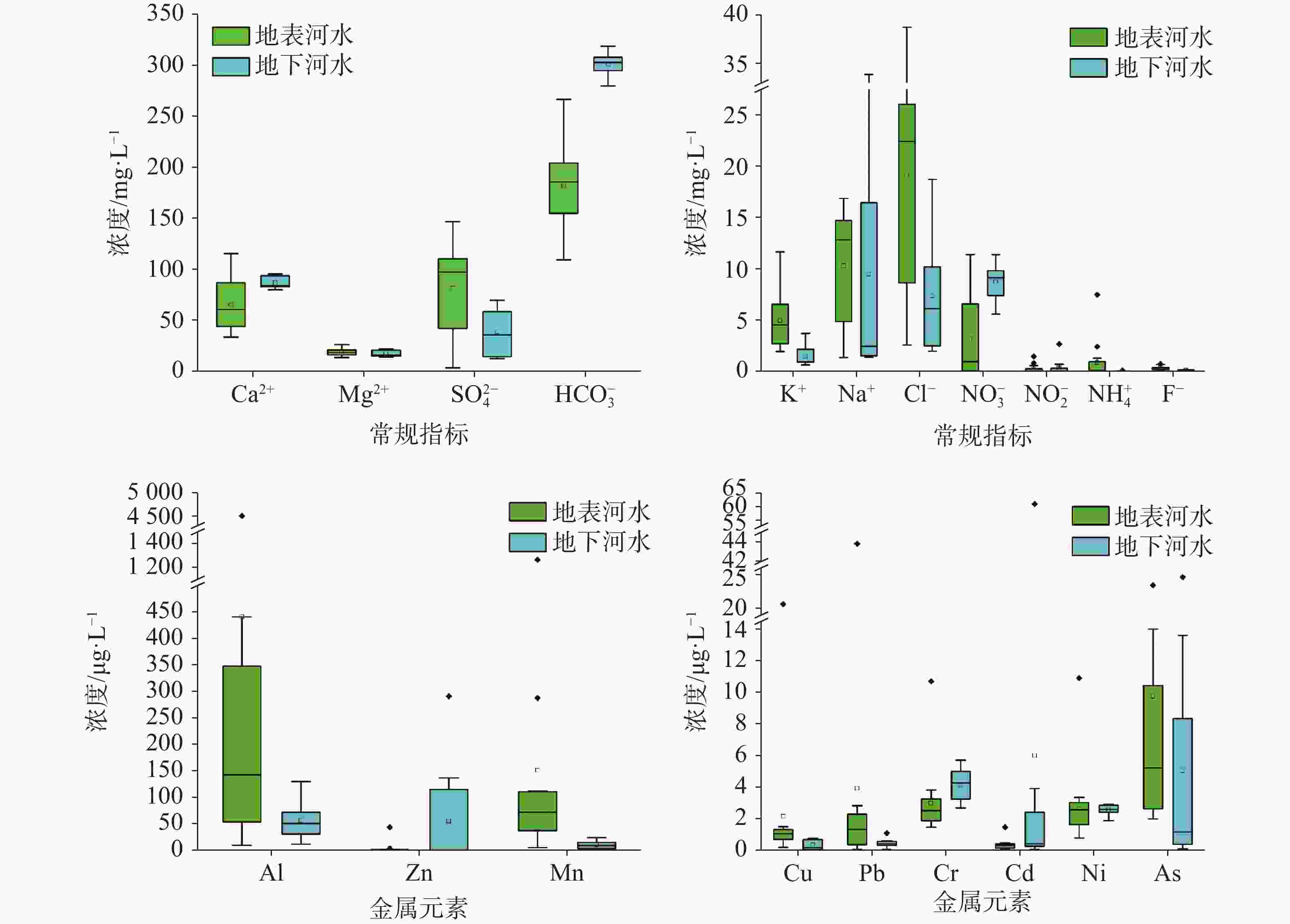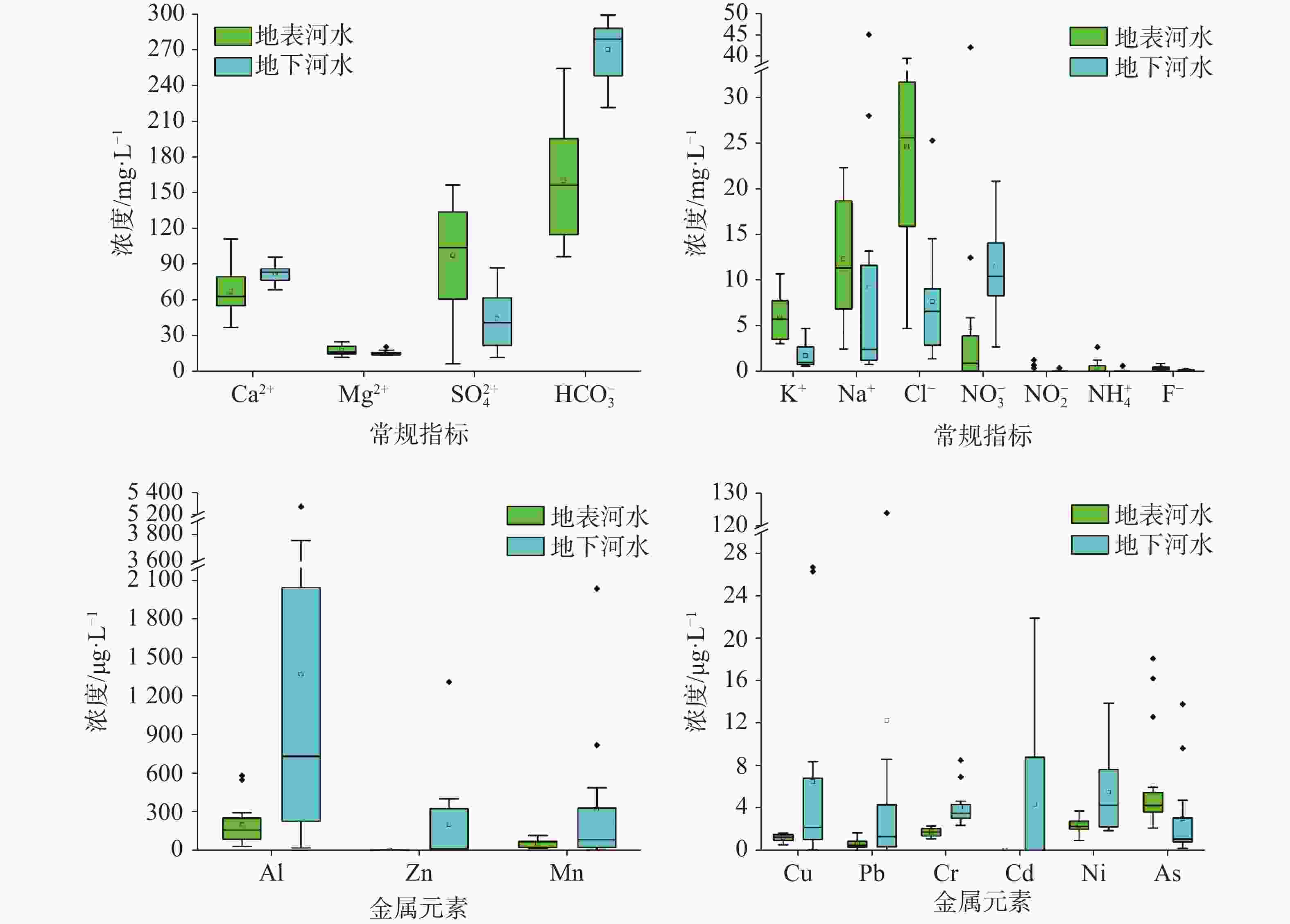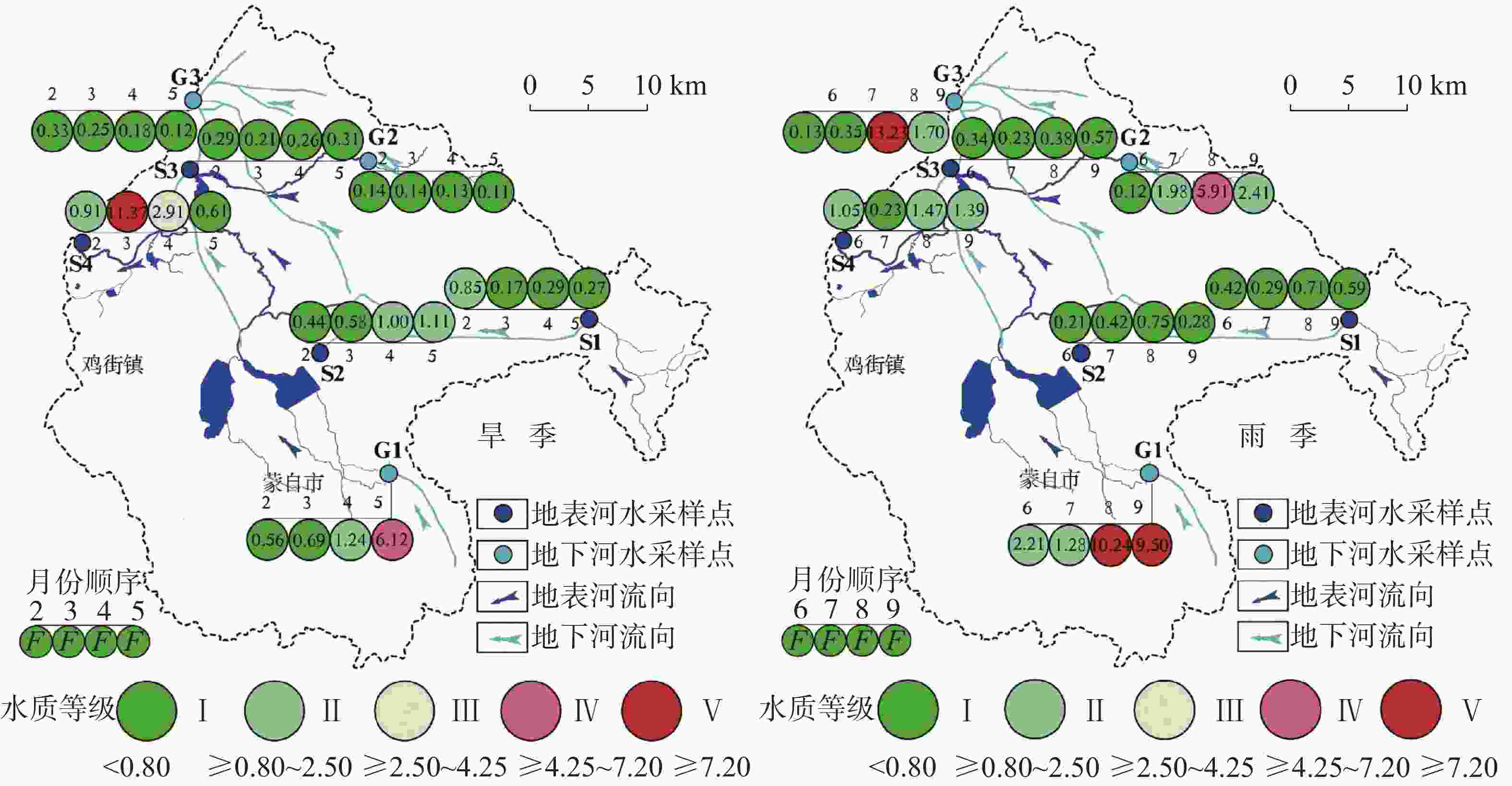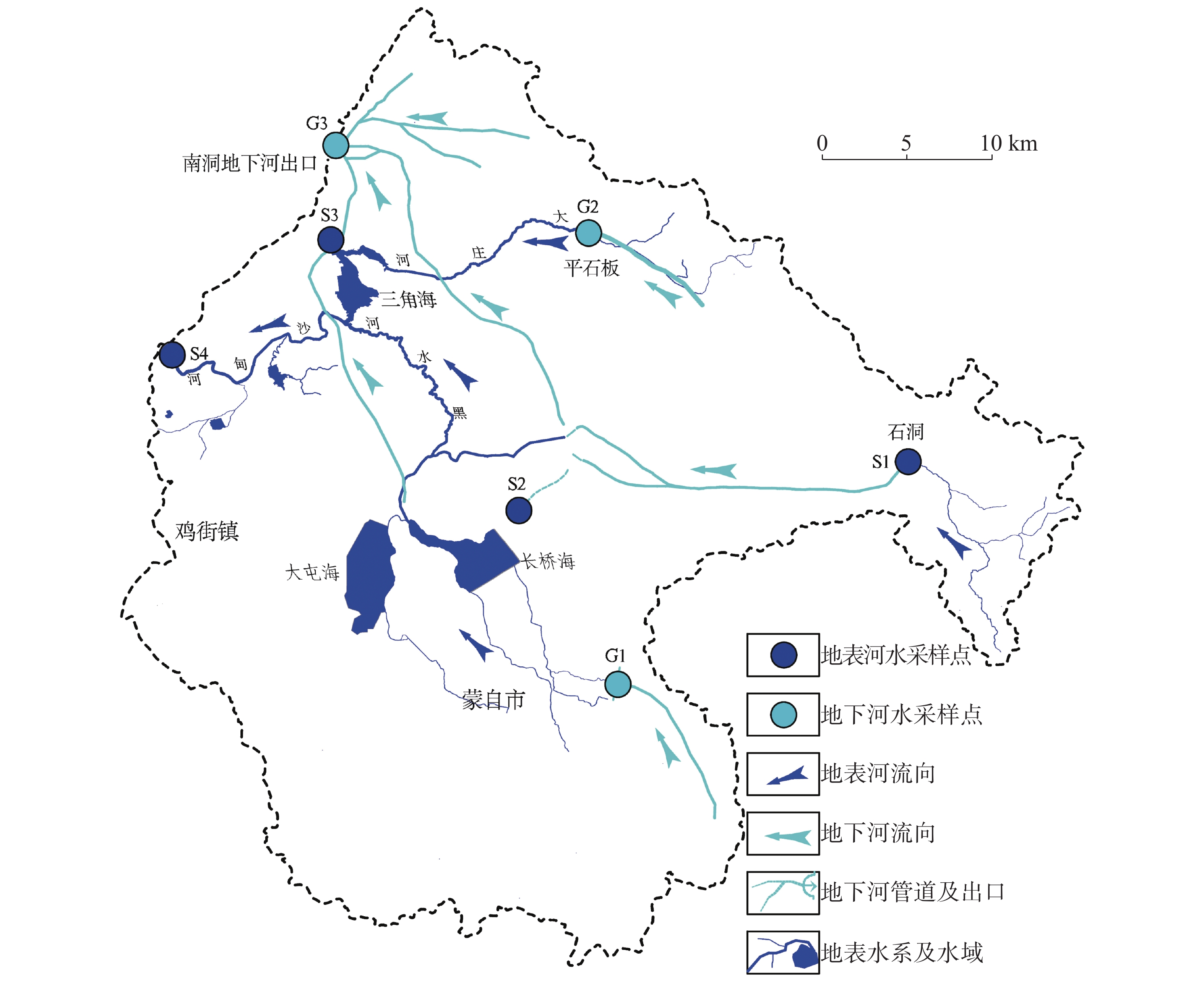Water quality analysis and evaluation of irrigation applicability in Nandong underground river basin, Southwest China
-
摘要: 为查明云南南洞地下河流域水质特征和农业灌溉适用性,分别在雨季和旱季共采集32组地表河水样和24组地下河水样,进行12种常规指标和9种金属元素检测。利用内梅罗综合指数法进行水质评价,利用钠含量法(SC)、钠吸附比法(SAR)、残余碳酸钠法(RSC)和渗透指数法(PI)揭示雨季和旱季水体的农业灌溉适用性。结果显示,区内水体主要呈弱碱性,Ca2+和
${\rm{HCO}}_3^{-}$ 为主导型离子。地表河水,常规指标仅NH$_4^{+}$ 含量超过我国相关水质标准限值,金属元素Al、Pb、Mn和As含量超标,旱季超标率总体高于雨季。地下河水的金属元素Al、Pb、Zn、Cr、Mn和As含量超标,雨季超标率总体高于旱季。工矿业活动排放和裸露型岩溶水文地质是导致水体金属元素含量超标的重要原因。据水质评价结果,区内水质整体较好,旱季和雨季水质处于良好及以上级别分别占比89.29%和85.71%。灌溉适用性评价结果显示,区内水体灌溉适用性整体较好,仅在旱季地表河水As含量(54.70 μg·L−1)高于农田灌溉水质标准中蔬菜和水作标准限值,不适合周边蔬菜和稻田的灌溉。Abstract: The karst surface water and groundwater of Nandong underground river basin are vital water sources for agricultural and industrial production, and lives of residents in Honghe Hani and Yi Autonomous Prefecture in Yunnan, Southwest China. With a growing public awareness of water environment and water safety, the evaluation of karst water quality and irrigation applicability especially in agricultural regions is becoming increasingly necessary. In this study, 32 samples of karst surface river water and 24 samples of underground river water were collected from Nandong underground river basin during dry and rainy seasons. 11 inorganic regular ions (i.e., K+, Na+, Ca2+, Mg2+, Cl−,${\rm{SO}}_4^{2-}$ ,${\rm{HCO}}_3^{-}$ ,${\rm{NO}}_3^{-}$ , NO$_2^{−}$ , NH$_4^{+}$ , and F−) and 9 heavy metals (i.e., Al, Cu, Pb, Zn, Cr, Cd, Ni, Mn, and As) were analyzed in these samples to investigate the water quality and irrigation applicability. Based on the measured concentrations of the hydrochemical composition, the Nemerow composite index in combination with the four irrigation assessment systems of sodium concentration (SC), sodium adsorption ratio (SAR), residual sodium carbonate (RSC), and permeability index (PI) were applied to evaluate the karst water quality and irrigation applicability, respectively. Results show that Ca2+ and${\rm{HCO}}_3^{-}$ were identified as the major ions in both karst surface water and karst groundwater, indicating weakly alkaline karst water in the study area. For karst surface water, among the 11 inorganic regular ions, only NH$_4^{+}$ was found exceeding the maximum acceptable level for drinking water recommended by General Administration of Quality Supervision, Inspection and Quarantine of the People's Republic of China. Meanwhile, among the 9 heavy metals, the concentrations of Al, Pb, Mn, and As were evaluated as exceeding the maximum acceptable level. Moreover, the rates of measured ions exceeding permitted levels in the dry season were generally higher than those in the rainy season. For karst groundwater, the concentrations of Al, Pb, Zn, Cr, Mn, and As exceeded the maximum acceptable levels, and the rates of these metals exceeding permitted levels in the rainy season were generally higher than those in dry season. The nitrogen synthetic fertilizers might be a main cause of the increase of NH$_4^{+}$ concentration in karst surface water. High concentration of Al, Mn, and Cd in karst water were mainly caused by large amounts of discharge from metal smelting, waste residue of mining, and open-pit mining. Furthermore, an exposed surface environment of bedrock in some parts of this study area might be responsible for these components exceeding the permitted levels due to the lack of surface decontamination of pollutants. The karst water quality belonging to the good grade or above accounted for 89.29% and 85.71% of the total water samples collected during the dry season and the rainy season, respectively, and the quality belonging to poor grade or below accounted for 7.14% and 14.29%, respectively. Hence, the karst water quality in Nandong underground river basin was generally high based on the results of the assessment of karst water quality. However, some cases of poor-quality karst water were found in parts of our study area (e.g., G1 and S4 sampling sites in the dry season and G1, G2, and G3 sampling sites in the rainy season), accompanied by the seasonal differences in karst water pollution. According to the permitted level for irrigation water and the results of SC, SAR, RSC, and PI assessments, most of the karst water in Nandong underground river basin was generally suitable for irrigation. However, it is noted that the concentration of As (54.70 μg·L−1) in the sampling site of surface water (i.e., S3) exceeded the permitted level for the irrigation of vegetables and water crops in the dry season, thereby being no longer suitable for irrigation. Our results suggest that the high concentrations of metal compositions (e.g., Al, Pb, Mn, and As) should be controlled by some targeted measures to prevent further metal pollution in karst water of Nandong underground river basin. Our study also provides an integrated method for the comprehensive understanding of water quality in karst surface water and groundwater. -
表 1 内梅罗综合指数评价等级分级
Table 1. Grading of Nemero comprehensive index
F 得分 <0.80 ≥0.80~2.50 ≥2.50~4.25 ≥4.25~7.20 ≥7.20 污染等级 Ⅰ Ⅱ Ⅲ Ⅳ Ⅴ 污染级别 优良 良好 较好 较差 极差 表 2 灌溉水适用性评分等级
Table 2. Index grades for irrigation applicability
评价参数 分类参考值 适用等级 评价参数 分类参考值 适用等级 SC/% <20 非常适合 SAR/
(meq·L−1)1/2<10 非常适合 20~40 较适合 10~18 较适合 40~60 适合 18~26 适合 60~80 不确定 >26 不适合 >80 不适合 RSC/meq·L−1 <1.25 非常适合 PI/% >75 Ⅰ类(非常适合) 1.25~2.50 适合 25~75 Ⅱ类(适合) >2.50 不适合 <25 Ⅲ类(不适合) 表 3 南洞地下河流域水体中常规指标统计/mg·L−1
Table 3. Statistics of the regular ions in Nandong underground river/mg·L−1
时期 统计量 pH K+ Na+ Ca2+ Mg2+ Cl− ${\rm{SO}}_4^{2-}$ ${\rm{HCO}}_3^{-}$ ${\rm{NO}}_3^{-}$ NO$_2^{−}$ NH$_4^{+}$ F− 地表河水 旱季 最大值 7.78 11.64 16.86 115.70 26.56 38.72 146.92 266.74 11.39 1.45 7.46 0.71 最小值 7.07 1.94 1.36 33.86 13.74 2.58 3.74 109.52 nd nd nd 0.04 平均值 7.41 4.92 10.31 65.25 19.22 19.10 82.02 181.62 3.21 0.21 0.85 0.32 标准差 0.20 2.66 5.60 25.68 3.57 11.03 49.12 44.89 3.76 0.52 2.27 0.19 变异系数 0.03 0.54 0.54 0.39 0.19 0.58 0.60 0.25 1.17 2.52 2.65 0.61 雨季 最大值 7.44 10.71 22.35 111.40 24.92 39.46 156.61 254.66 42.06 1.24 2.66 0.86 最小值 6.84 3.04 2.44 36.98 11.87 4.70 6.39 96.41 nd nd nd 0.09 平均值 7.23 5.87 12.32 67.36 17.66 24.65 97.38 160.00 4.75 0.14 0.41 0.37 标准差 0.16 2.53 6.33 22.27 4.29 10.64 51.27 47.85 12.61 0.48 0.87 0.22 变异系数 0.02 0.43 0.51 0.33 0.24 0.43 0.53 0.30 2.65 3.34 2.13 0.58 地下河水 旱季 最大值 7.96 3.7 33.87 95.59 22.10 18.69 69.88 318.78 11.38 2.66 nd 0.17 最小值 7.15 0.63 1.37 80.18 14.47 1.96 12.56 279.75 5.58 0.002 nd 0.04 平均值 7.42 1.43 9.46 86.82 17.53 7.33 38.83 301.16 8.74 0.34 / 0.09 标准差 0.22 0.93 12.04 5.95 2.92 5.41 22.31 11.02 1.72 0.76 / 0.04 变异系数 0.03 0.65 1.27 0.07 0.17 0.74 0.57 0.04 0.20 2.27 / 0.47 雨季 最大值 7.59 4.71 45.10 96.00 20.62 25.34 87.10 299.27 20.87 0.37 0.60 0.23 最小值 7.25 0.57 0.76 68.71 13.78 1.38 11.68 221.92 2.68 nd nd nd 平均值 7.40 1.69 9.21 82.00 15.44 7.62 44.14 270.05 11.49 0.03 0.05 0.11 标准差 0.12 1.35 13.86 8.15 2.02 6.79 25.71 27.54 5.51 0.16 0.33 0.06 变异系数 0.02 0.80 1.51 0.10 0.13 0.89 0.58 0.10 0.48 4.63 6.28 0.51 水质标准 地表水(Ⅲ) 6~9 — — — — 250 250 — 44.29 — 1.29 1.0 地下水(Ⅲ) 6.5~8.5 — 200 — — 250 250 — 88.57 3.29 0.64 1.0 生活饮用水 6.5~8.5 — 200 — — 250 250 — 44.29 — 0.64 1.0 注:nd表示未检出,“/”表示无计算值,“—”表示无相应参考标准值,黑体字表示此浓度超标。 表 4 南洞地下河流域水体中金属浓度统计/μg·L−1
Table 4. Statistics of the metal concentrations in Nandong underground river/μg·L−1
时期 统计量 Al Cu Pb Zn Cr Cd Ni Mn As 地表河水 旱季 最大值 4 514.00 20.60 43.80 43.90 10.70 1.46 10.90 1 266.00 54.70 最小值 9.90 0.17 nd nd 1.45 nd 0.78 5.33 1.98 平均值 440.65 2.16 3.91 3.35 2.97 0.33 2.85 151.47 9.73 标准差 1 095.81 4.93 11.00 16.00 2.18 0.33 2.28 304.64 13.28 变异系数 2.49 2.28 2.82 4.77 0.74 0.99 0.80 2.01 1.36 超标率/% 37.50 0 6.25 0 0 0 0 31.25 25.00 雨季 最大值 582.00 1.66 1.67 6.06 2.32 nd 3.72 116.00 18.10 最小值 33.10 0.55 nd nd 1.10 nd 0.95 17.20 2.12 平均值 200.89 1.20 0.63 1.66 1.72 / 2.38 55.22 6.18 标准差 162.01 0.36 0.46 1.63 0.41 / 0.69 30.62 4.88 变异系数 0.81 0.30 0.74 0.98 0.24 / 0.29 0.55 0.79 超标率/% 37.50 0 0 0 0 0 0 6.25 18.75 地下河水 旱季 最大值 130.00 0.75 1.08 291.00 5.70 61.00 2.91 24.40 24.60 最小值 12.10 nd nd nd 2.68 nd 1.88 2.44 0.09 平均值 56.49 0.32 0.42 54.83 4.12 5.99 2.56 10.55 5.03 标准差 34.18 0.28 0.23 85.53 1.02 18.95 0.34 7.40 7.66 变异系数 0.61 0.87 0.55 1.56 0.25 3.17 0.13 0.70 1.52 超标率/% 0 0 0 0 0 8.33 0 0 25.00 雨季 最大值 5 274.00 26.70 124.00 1 311.00 8.51 21.90 13.90 2 035.00 13.80 最小值 19.90 nd nd nd 2.38 nd 1.88 2.54 0.20 平均值 1 370.12 6.49 12.26 203.11 4.13 4.34 5.47 322.15 3.02 标准差 1 656.96 10.12 38.50 439.51 1.81 7.88 3.97 592.32 4.31 变异系数 1.21 1.56 3.14 2.16 0.44 1.82 0.73 1.84 1.43 超标率/% 75.00 0 8.33 8.33 0 33.33 0 33.33 8.33 水质标准 地表水 — 1 000 50 1 000 50 5 — 100 50 地下水 200 1 000 10 1 000 50 5 20 100 10 生活饮用水 200 1 000 10 1 000 50 5 20 100 10 注:nd表示未检测出,“—”为无相应参考标准值,“/”为无计算结果,黑体字表示此浓度超标 表 5 南洞地下河流域水体水质评价结果
Table 5. Water quality assessment in Nandong underground river basin
时期 统计量 单项指数得分 内梅罗综合
指数得分Na+ Cl− ${\rm{SO}}_4^{2-}$ ${\rm{NO}}_3^{-}$ NH$_4^{+}$ F− Al Cu Pb Zn Cr Cd Ni Mn As 地表河水 旱季 平均值 0.05 0.08 0.33 0.07 0.67 0.32 2.20 0.002 0.078 0.003 6 0.06 0.068 0.14 1.41 0.19 1.350 最大值 0.08 0.15 0.59 0.26 5.78 0.71 22.57 0.021 0.876 0.043 9 0.21 0.292 0.55 12.66 1.09 11.369 最小值 0.01 0.01 0.01 0.001 0.01 0.04 0.05 0.000 2 0.001 0.000 4 0.03 0.006 0.04 0.05 0.04 0.171 雨季 平均值 0.06 0.10 0.39 0.11 0.32 0.37 1.00 0.001 0.013 0.001 8 0.03 0.006 0.12 0.55 0.12 0.583 最大值 0.11 0.16 0.63 0.95 2.06 0.86 2.91 0.002 0.033 0.006 1 0.05 0.006 0.19 1.16 0.36 1.473 最小值 0.01 0.02 0.03 0.001 0.01 0.09 0.17 0.000 6 0.001 0.000 4 0.02 0.006 0.05 0.17 0.04 0.211 地下河水 旱季 平均值 0.04 0.03 0.16 0.10 0.025 0.09 0.28 0.000 3 0.043 0.055 0.08 1.198 0.13 0.11 0.50 0.834 最大值 0.17 0.07 0.28 0.13 0.125 0.17 0.65 0.000 8 0.108 0.291 0.11 12.200 0.15 0.24 2.46 6.119 最小值 0.01 0.01 0.05 0.06 0.016 0.04 0.06 0.000 1 0.004 0.000 4 0.05 0.006 0.09 0.02 0.01 0.112 雨季 平均值 0.05 0.03 0.18 0.13 0.10 0.10 6.85 0.006 5 1.226 0.203 0.08 0.87 0.27 3.22 0.30 4.089 最大值 0.23 0.10 0.35 0.24 0.94 0.23 26.37 0.026 7 12.400 1.311 0.17 4.38 0.70 20.35 1.38 13.231 最小值 0.004 0.01 0.05 0.03 0.02 0.01 0.10 0.000 1 0.004 0.000 4 0.05 0.006 0.09 0.03 0.02 0.117 表 6 南洞地下河流域水体农田灌溉适用性分布
Table 6. Distribution of irrigation applicability of Nandong underground river basin
指标 常规指标/mg·L−1 金属元素/μg·L−1 pH Cl− F− Cu Pb Zn Cr Cd As 地表河水 旱季 最大值 7.78 38.72 0.71 20.60 43.80 43.90 10.70 1.46 54.70 最小值 7.07 2.58 0.04 0.17 nd nd 1.45 nd 1.98 平均值 7.41 19.10 0.32 2.16 3.91 3.35 2.97 0.33 9.73 雨季 最大值 7.44 39.46 0.86 1.66 1.67 6.06 2.32 nd 18.10 最小值 6.84 4.70 0.09 0.55 nd nd 1.10 nd 2.12 平均值 7.23 24.65 0.37 1.20 0.63 1.66 1.72 / 6.18 地下河水 旱季 最大值 7.96 18.69 0.17 0.75 1.08 291.00 5.70 61.00 24.60 最小值 7.15 1.96 0.04 nd nd nd 2.68 nd 0.09 平均值 7.42 7.33 0.09 0.32 0.42 54.83 4.12 5.99 5.03 雨季 最大值 7.59 25.34 0.23 26.70 124.00 1 311.00 8.51 21.90 13.80 最小值 7.25 1.38 nd nd nd nd 2.38 nd 0.20 平均值 7.40 7.62 0.11 6.49 12.26 203.11 4.13 4.34 3.02 农田灌溉
水质标准水作 5.5~8.5 350 2 500 200 2 000 100 10 50 旱作 5.5~8.5 350 2 1 000 200 2 000 100 10 100 蔬菜 5.5~8.5 350 2 1 000 200 2 000 100 10 50 nd-表示未检测出;“/”表示无计算值;pH无纲量。 表 7 南洞地下河流域水体灌溉适用性评价结果
Table 7. Assessment results of irrigation applicability of Nandong underground river basin
指标 SAR SC PI RCS 综合 地表河水 旱季 平均级别 非常适合 非常适合 Ⅱ(适合) 非常适合 适合 最大级别 非常适合 非常适合 Ⅱ(适合) 非常适合 适合 雨季 平均级别 非常适合 非常适合 Ⅱ(适合) 非常适合 适合 最大级别 非常适合 非常适合 Ⅱ(适合) 非常适合 适合 地下河水 旱季 平均级别 非常适合 非常适合 Ⅱ(适合) 非常适合 适合 最大级别 非常适合 较适合 Ⅱ(适合) 非常适合 适合 雨季 平均级别 非常适合 非常适合 Ⅱ(适合) 非常适合 适合 最大级别 非常适合 较适合 Ⅱ(适合) 非常适合 适合 -
[1] Jiang Y, Wu Y, Groves C, Yuan D, Kambesis P. Natural and anthropogenic factors affecting the groundwater quality in the Nandong karst underground river system in Yunan, China[J]. Journal of Contaminant Hydrology, 2009, 109:49-61. doi: 10.1016/j.jconhyd.2009.08.001 [2] 袁道先, 蔡桂鸿. 岩溶环境学[M]. 重庆: 重庆出版社, 1988, 20-30.YUAN Daoxian, CAI Guihong. Karst Environmentology[M]. Chongqing: Chongqing Publishing House, 1988, 20-30. [3] 朱秀群. 南洞岩溶水系统水文地球化学特征及形成机制研究[D]. 北京: 中国地质大学(北京), 2020.ZHU Xiuqun. Study on hydrogeochemistry characteristics and formation mechanism in Nandong karst water system[D]. Beijing: China University of Geosciences, 2020. [4] 李军, 邹胜章, 梁永平, 林永生, 周长松, 赵一. 会仙岩溶湿地水体金属元素分布与健康风险评价[J]. 环境科学, 2020, 41(11):4948-4957. doi: 10.13227/j.hjkx.202003212LI Jun, ZOU Shengzhang, LIANG Yongping, LIN Yongsheng, ZHOU Changsong, ZHAO Yi. Metal distributions and human health risk assessments on waters in Huixian karst wetland, China[J]. Environmental Science, 2020, 41(11):4948-4957. doi: 10.13227/j.hjkx.202003212 [5] Kohl D H, Shearer B G, Commoner B. Fertiliter nitrogen: Contribution to nitrate in surface water in a Corn Belt Watershed[J]. Science, 1971, 174: 1331-1334. [6] Nestler A, Berglund M, Accoe F, Duta S, Xue D, Boeckx P, Taylor P. Isotopes for improved management of nitrate pollution in aqueous resources: Review of surface water field studies[J]. Environmental Science and Pollution Research, 2011, 18: 519-533. [7] Burkart M R, Kolpin D W. Hydrologic and land-use factors associated with herbicides and nitrate in near-surface aquifers[J]. Journal of Environmental Quality, 1993, 22(4):646-656. [8] MIAO Xiongyi, HAO Yupei, ZHANG Fawang, ZOU Shengzhang, YE Siyuan, XIE Zhouqing. Spatial distribution of heavy metals and their potential sources in the soil of Yellow River Delta: A traditional oil field in China[J]. Environmental Geochemistry and Health, 2019, 42(1):7-26. [9] LI Jun, MIAO Xiongyi, HAO Yupei, XIE Zhouqing, ZOU Shengzheng, ZHOU Changsong. Health risk assessment of metals (Cu, Pb, Zn, Cr, Cd, As, Hg, Se) in angling fish with different lengths collected from Liuzhou, China[J]. International Journal of Environmental Research Public Health, 2020, 17, 2192. [10] ZHAO Xuemin, YAO Lingai, Ma Qianli, ZHOU Guangjie, XU Zhencheng. Distribution and ecological risk assessment of cadmium in water and sediment in Longjiang River, China: Implication on water quality management after pollution accident[J]. Chemosphere, 2017, 194:107. [11] Parise M, Waele J D, Gutierrez F. Current perspectives on the environmental impacts and hazards in karst[J]. Environmental Geology, 2009, 58(2):235-237. doi: 10.1007/s00254-008-1608-2 [12] Jiang Zhongcheng, Lian Yanqing, Qin Xiaojun. Rocky desertification in Southwest China: Impacts, causes, and restoration[J]. Earth-Science Reviews, 2014, 132(3):1-12. [13] Jiang Yongjun, Yan Jun. Effects of land use on hydrochemistry and contamination of karst groundwater from Nandong underground river system, China[J]. Water, Air, and Soil Pollution, 2010, 210:123-141. [14] Li Y Q, Jiang Z C, Chen Z H, Yu Y, Lan F, Shan Z J, Sun Y J, Liu P, Tang X B, Rodrigo-Comino J. Anthropogenic disturbances and precipitation affect karst sediment discharge in the Nandong Underground River System in Yunnan, Southwest China[J]. Sustainability, 2020, 12:3006. doi: 10.3390/su12073006 [15] 莫美仙, 王宇, 李峰, 虞慧. 云南南洞地下河系统边界及性质研究[J]. 中国岩溶, 2019, 38(2):173-185.MO Meixian, WANG Yu, LI Feng, YU Hui. Study on the boundaries and properties of the underground river system in Nandong, Yunnan Province[J]. Carsologica Sinica, 2019, 38(2):173-185. [16] 伍鹏, 舒倩, 罗小芳, 伍钢. 湘西古丈烂泥田锰矿区地表水污染特征及风险评价[J]. 水土保持通报, 2019, 39(3):70-74. doi: 10.13961/j.cnki.stbctb.2019.03.012WU Peng, SHU Qian, LUO Xiaofang, WU Gang. Surface water pollution and risk assessment at a manganese mining area located in mud field in Guzhang county of western Hu'nan Province[J]. Bulletin of Soil and Water Conservation, 2019, 39(3):70-74. doi: 10.13961/j.cnki.stbctb.2019.03.012 [17] 周巾枚, 蒋忠诚, 徐光黎, 覃小群, 黄奇波, 张连凯. 崇左响水地区地下水水质分析及健康风险评价[J]. 环境科学, 2019, 40(6):2675-2685.ZHOU Jinmei, JIANG Zhongcheng, XU Guangli, QIN Xiaoqun, HUANG Qibo, ZHANG Liankai. Water quality analysis and health risk assessment for groundwater at Xiangshui, Chongzuo[J]. Environmental Science, 2019, 40(6):2675-2685. [18] 国家环境保护总局. GB 3838—2002 地表水环境质量标准[S].State Bureau of Environmental Protection. GB 3838—2002 Environmental quality standards for surface water[S]. [19] 国家技术监督局. GB/T14848—2017 地下水质量标准[S].The State Bureau of Quality and Technical Supervision. GB/T14848—2017 Quality standard for ground water[S]. [20] 中华人民共和国卫生部. GB5749—2006 生活饮用水卫生标准[S].Ministy of Health P. R. China. GB5749—2006 Standard of drinking water quality[S]. [21] 毛萌, 朱雪芹. 宣化盆地地下水化学特性及灌溉适用性评价[J]. 干旱区资源与环境, 2020, 34(7):142-149. doi: 10.13448/j.cnki.jalre.2020.195MAO Meng, ZHU Xueqin. Chemical characteristics of groundwater in Xuanhua basin and assessment of irrigation applicability[J]. Journal of Arid Land Resources and Environment, 2020, 34(7):142-149. doi: 10.13448/j.cnki.jalre.2020.195 [22] Sen Z. Practical and Applied Hydrogeology[M]. Elsevier, 2015. [23] 朱丹尼, 邹胜章, 李军, 樊连杰, 赵一, 谢浩, 朱天龙, 潘民强, 徐利. 会仙岩溶湿地丰平枯水期地表水污染及灌溉适用性评价[J]. 环境科学, 2021, 42(5):2240-2250.ZHU Danni, ZOU Shengzhang, LI Jun, FAN Lianjie, ZHAO Yi, XIE Hao, ZHU Tianlong, PAN Minqiang, XU Li. Pollution and irrigation applicability on surface water from wet, normal, and dry periods in Huixian karst wetland, China[J]. Environmental Science, 2021, 42(5):2240-2250. [24] 张恒星, 张翼龙, 李政红, 王文中, 郝奇琛. 基于主导离子分类的呼和浩特盆地浅层地下水化学特征研究[J]. 干旱区资源与环境, 2019, 33(4):189-195.ZHANG Hengxing, ZHANG Yilong, LI Zhenghong, WANG Wenzhong, HAO Qichen. Chemical characteristics of shallow groundwater in Hohhot basin[J]. Journal of Arid Land Resources and Environment, 2019, 33(4):189-195. [25] 王波, 王宇, 张贵, 张华, 代旭升, 康晓波. 滇东南泸江流域岩溶地下水质量及污染影响因素研究[J]. 地球学报, 2021, 42(3):352-362.WANG Bo, WANG Yu, ZHANG Gui, ZHANG Hua, DAI Xusheng, KANG Xiaobo. A study of quality and pollution factors of karst groundwater in Lujiang river basin in southeast Yunnan[J]. Acta Geoscientica Sinica, 2021, 42(3):352-362. [26] 李军, 邹胜章, 赵一, 赵瑞科, 党志文, 潘民强, 朱丹尼, 周长松. 会仙岩溶湿地地下水主要离子特征及成因分析[J]. 环境科学, 2021, 42(4):1750-1760.LI Jun, ZOU Shengzhang, ZHAO Yi, ZHAO Ruike, DANG Zhiwen, PAN Minqiang, ZHU Danni, ZHOU Changsong. Major ionic characteristics and factors of karst groundwater at Huixian karst wetland, China[J]. Environmental Science, 2021, 42(4):1750-1760. [27] 周巾枚, 蒋忠诚, 徐光黎, 覃小群, 黄奇波, 张连凯. 崇左响水地区岩溶地下水主要离子特征及控制因素[J]. 环境科学, 2019, 40(5):2143-2151. doi: 10.13227/j.hjkx.201810021ZHOU Jinmei, JIANG Zhongcheng, XU Guangli, QIN Xiaoqun, HUANG Qibo, ZHANG Liankai. Major ionic characteristics and controlling factors of karst groundwater at Xiangshui, Chongzuo[J]. Environmental Science, 2019, 40(5):2143-2151. doi: 10.13227/j.hjkx.201810021 [28] 魏兴, 周金龙, 乃尉华, 曾妍妍, 范薇, 李斌. 新疆喀什三角洲地下水SO42−化学特征及来源[J]. 环境科学, 2019(8):3550-3558.WEI Xing, ZHOU Jinlong, NAI Weihua, ZENG Yanyan, FAN Wei, LI Bin. Chemical characteristics and sources of groundwater sulfate in the Kashgar Delta, Xinjiang[J]. Environmental Science, 2019(8):3550-3558. [29] Delpla I, Jung A V, Bauers E, Clement M, Thomas O. Impact of climate change on surface water quality in relation to drinking water production[J]. Environment Internation, 2009, 35(8):1225-1233. [30] Nolan B T, Hitt K J. Vulnerability of shallow groundwater a drinking-water wells to nitrate in the United States[J]. Environmental Science and Technology, 2006, 40(24):7834-7840. [31] 张小文, 何江涛, 黄冠星. 石家庄地区浅层地下水铁锰分布特征及影响因素分析[J]. 地学前缘, 2020. doi: 10.13745/j.esf.sf.2020.7.4.ZHANG Xiaowen, HE Jiangtao, HUANG Guanxing. Distribution characteristics and cause analysis of iron and manganese in shallow groundwater in Shijiazhuang area[J]. Earth Science Frontiers, 2020. doi: 10.13745/j.esf.sf.2020.7.4. [32] 王宇. 西南岩溶地区岩溶水系统分类、特征及勘查评价要点[J]. 中国岩溶, 2002(2):44-49. doi: 10.3969/j.issn.1001-4810.2002.02.008WANG Yu. Classification, features of karst water system and key point for the evaluation to karst water exploration in Southwest China karst area[J]. Carsologica Sinica, 2002(2):44-49. doi: 10.3969/j.issn.1001-4810.2002.02.008 [33] 刘全吉. 冬小麦、油菜对砷污染反应的比较研究[D]. 武汉: 华中农业大学, 2008.LIU Quanji. Comparision of responses of winter wheat (Triticum aestivum L.) and rape (Brassica napus) to arsenic stress pollution[D]. Wuhan: Huazhong Agricultural University, 2008. [34] 张秀武. 葫芦岛市锌厂周围砷污染格局与生态风险评价[D]. 北京: 中国科学院, 2008.ZHANG Xiuwu. Spatial pattern and risk assessment of soil arsenic around Huludao zinc plant[D]. Beijing: Chinese Academy of Sciences, 2008. [35] 国家环境保护局. GB 5084-2005 农田灌溉水质标准[S].State Bureau of Environmental Protection. GB 5084-2005 Standard for irrigation water quality[S]. -











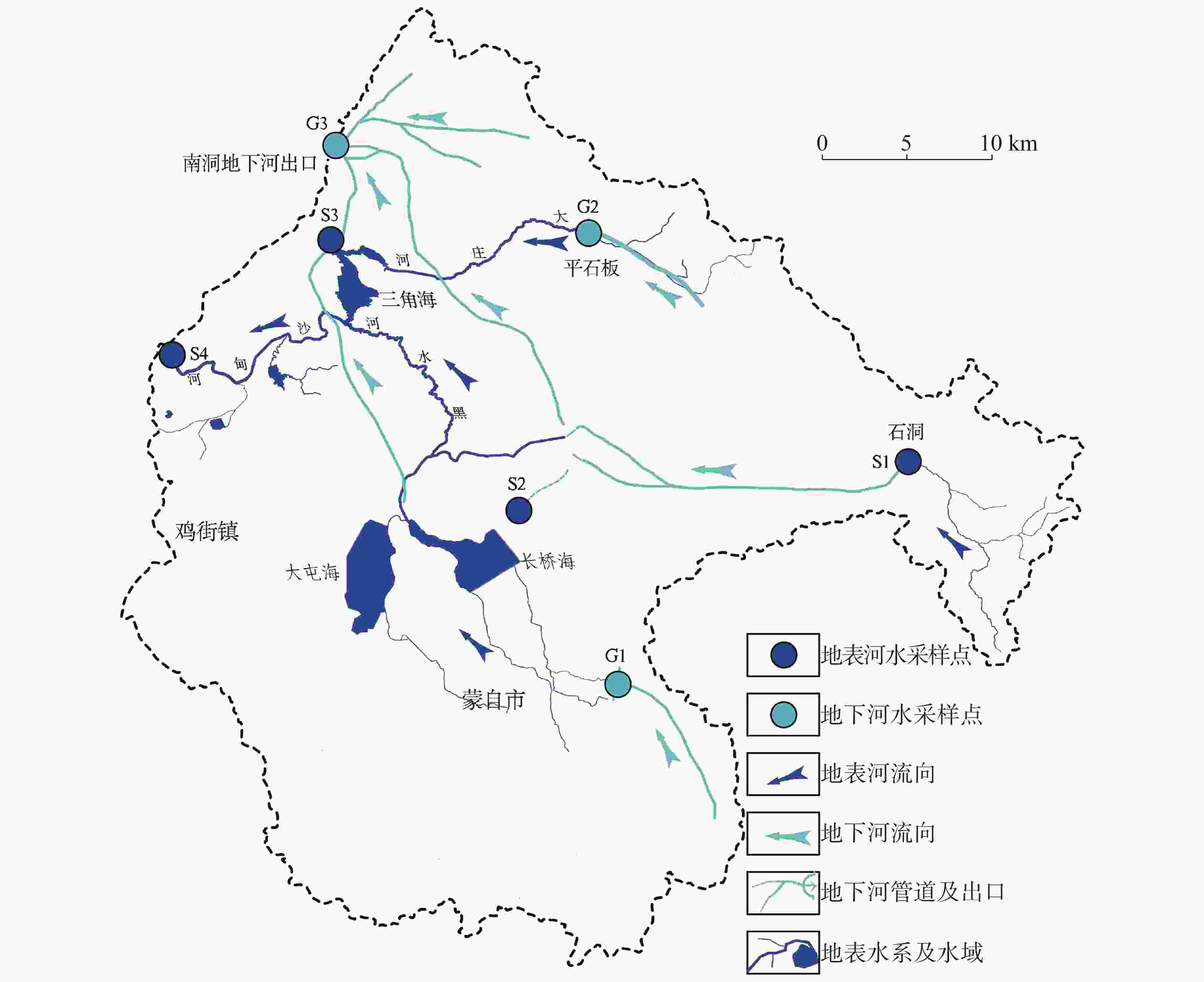
 下载:
下载:
